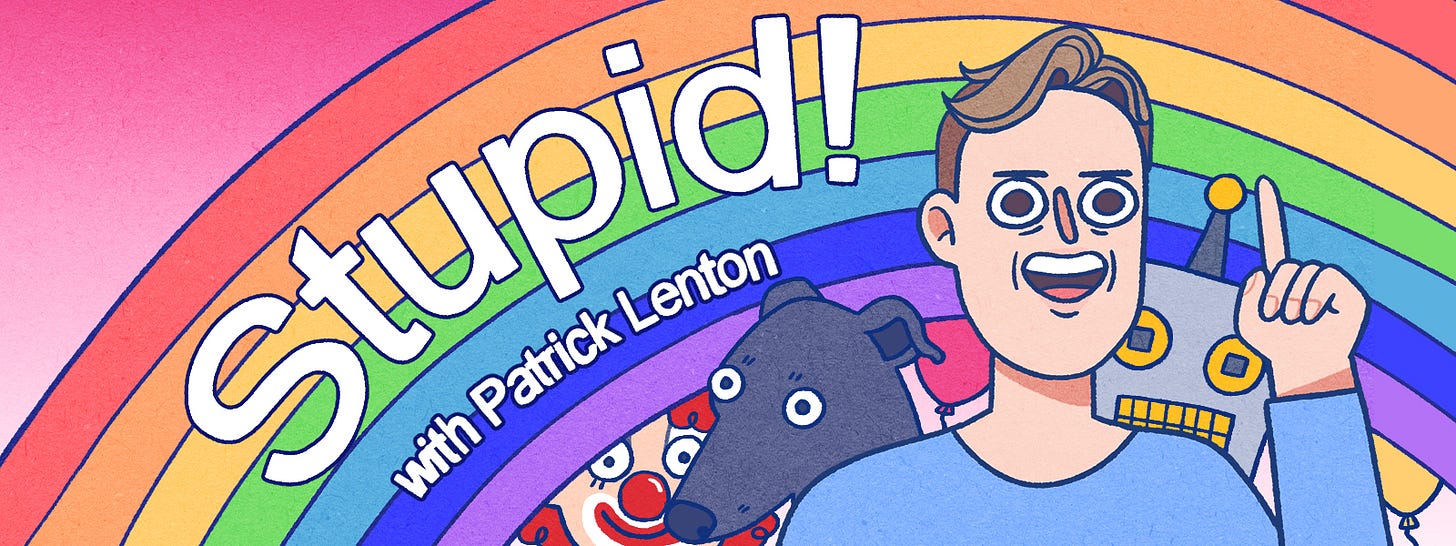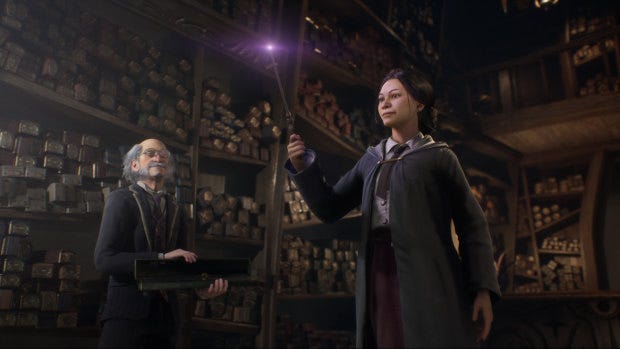The Hogwarts Legacy legacy is just being a shit friend to trans people
the new harry potter game has become a flashpoint for cultural debate about trans rights. you also can't spell "legacy" without "legs" and "ass".
Last night I was at the Phoebe Bridgers concert in Melbourne, because I am what? Bisexual and sad. During her performance, she took a moment to reference Margaret Court, the famously homophobic tennis player whose titular venue she was playing in, and by reference, I mean call her a cunt, and then get the crowd to chant “Fuck Margaret Court”. It was an iconic moment, and quite funny. And a unifying moment for the giant arena to voice their disapproval of homophobia and transphobia.

While this was happening, I was thinking about the point of the chant, and because we live in cursed times, I was also thinking about committed billionaire transphobe JK Rowling and the new Hogwarts Legacy video game, which has been released and has become one of those weird cultural points of contention, where something as small and silly as a game begins to represent much more than it really should, becomes an axis for an entire debate.
Should it be overtaking the conversation about punitive laws against trans people and the rise of violence against the LGBTIQ+ community? Of course not, but it is what it is. Pop culture unfortunately is often a vehicle for mass conversation.
Phoebe Bridgers’ crowd was huge and overwhelmingly young, and incredibly queer. By having a go at Margaret Court, by creating the chant, she was telling her queer audience that they were welcome and safe in this space, that homophobia and transphobia were not going to be ignored.
It was symbolic, and it made me realise how powerful symbolism is when it comes to creating safe spaces for marginalised communities.
To try and summarise the Hogwarts Legacy issue briefly, the debate is basically about whether buying and playing Hogwarts Legacy is endorsing and supporting JK Rowling and her transphobia. Many people are saying that this is the case - pointing to concrete things like enabling her views (she has said that she considers continued support of her work as endorsement of her views), and funnelling money back to her which she has already said she will use in her crusade against trans people. Many committed right wingers, transphobes and terfs are vociferously supporting the game as a result, many bragging about buying multiple copies, which is hilarious in itself.
And then there’s a whole bunch of people seeking some form of compromise between buying and enjoying the game, but also trying to distance themselves from any perceived transphobia in the process – a cake and eat it too mentality. A particular battleground for this mentality is the world of Twitch, where many streamers are aware of the loss of income they might suffer from not playing such a high profile game on their channels, and are attempting to commit to being trans allies and still make bank. Some are even trying to do a kind of absolution theory, where they are donating portions of their profits to trans charities, as if they can purchase a medieval indulgence from being cancelled.

So much of the debate from all sides has focused on the point of boycotting Hogwarts Legacy – as a lot of conservatives keep trying to boast about, the game is and will be successful, and sell many copies. As many people keep pointing out, it’s not going to change the mind of JK Rowling, or influence her views on transphobia. And not playing or purchasing a computer game isn’t going to make an inherent difference to the day-to-day life of a trans person.
But all of this misses the point of why we protest, of why we stand in solidarity. It’s about symbolism.
I think symbolism gets a bad wrap, written off as a fruity narrative device, rather than as one of the most powerful ways that we make a statement, or that we tell stories together. In advocacy and activism, we use symbolism to express our intent, to confirm our views. When we do something like a march, we aren’t walking from one end of Sydney to the other because we believe equality lies at the other end, a pot of gold that we can pick up and carry around, that this is the utilitarian, efficient way of reaching that. We don’t think there’s a certain amount of steps necessary to reach marriage equality. We do it because it is a symbolic statement, our bodies and our presence confirming what we believe in.
And who is that for? It’s to show the people in power, sure – but the concrete benefit is for the marginalised community who we are marching for. It’s making sure there’s more than just empty words of support. It’s to express that they are not alone, and that we are with them.
There is a targeted and pervasive attack on trans people around the world right now. This is not a hyperbole. From increased hysteria in the media, to hundreds of anti-LGBTIQ+ bills in US parliament, to the frenzied “debate” about trans women in sport, to the increased rhetoric calling trans people groomers and pedophiles, to violence and murder and mass-shooting, there is a spotlight of hate on our trans friends right now. This is fundamental, factual, stuff that is happening.
More than ever, being an ally to the trans community means doing something concrete, means more than just empty gestures and words of support. Boycotting a game that has become symbolic in itself of not supporting the trans community therefore becomes the simplest way to be an ally. It is the simplest thing in the world to not play a game (especially because I’m old now and I get confused by all the buttons).
There are plenty of people in this debate who believe themselves to be trans and queer allies, but have come to a point where their solidarity comes at the expense of something they want - which incredibly in this situation, is to play a wizard game. One of the surest signs of being a performative ally is when it’s conditional on your terms - if flying around on a broom is the point which you stop supporting the trans community, then it’s probably indicative of something deeper, or at least incredible laziness. And even if it’s not - think about what that looks like to your trans friends? Are you creating a safe space for them when you can’t even prioritise their friendship and wellbeing over a kinda dodgy looking open world game based off a series we really needed to stop reading a long time ago? What does your “support” actually consist of, actually mean, if it stops at this tiny and stupid bump?
So much of being an ally is about showing that you are not just someone sympathetic or politically aligned, but that you are someone that a trans person can be their genuine self around, that you are safe. The simplest form of allyship, of advocacy for the queer community is through making this space, declaring this space.
Making the symbolic gesture of not playing a game set in the world of a prominent and vicious terf is a form of declaring a safe space in your life, in your community, for your trans friends.
At the end of the day, the only legacy to playing Hogwarts Legacy is that you’re showing exactly what trans people mean to you. I think it’s that simple.
Also, to paraphrase Phoebe Bridgers, JK Rowling fuck that stupid ass dumb ass bitch.
Welcome to our new All The Heterosexual Nonsense column, which is called Stupid! With Patrick Lenton, a fortnightly newsletter exploring the intersection of pop-culture, comedy, and queer stuff. Please subscribe if you liked it, and please share!









This was so wonderfully written! I only know of one person who was excited to buy it (at least, who spoke about it out loud), who kept saying that she supported HP but not JKR... the money trail means they are the same thing. Then kept saying but it was part of her childhood and she couldn't give up part of her childhood... as if that absolves all sins. A lot of things in childhood throughout the ages ends up being very problematic and shit, and if you use that as an excuse then there would never be any progress. It just makes me very frustrated and sad that people won't subject themselves to the slightest inconvenience to be a good ally.